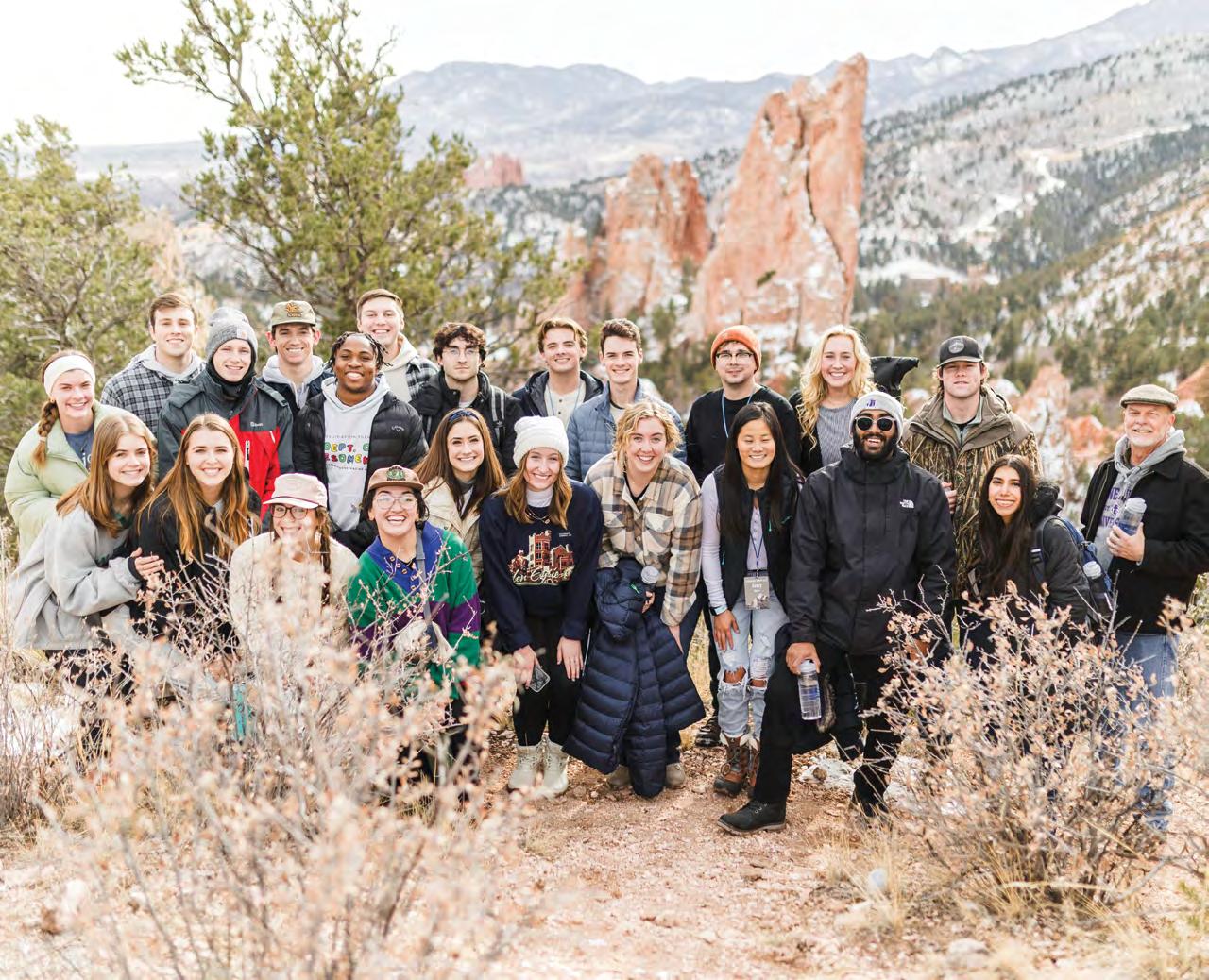2024 DEAN’S REPORT
College of Business Administration



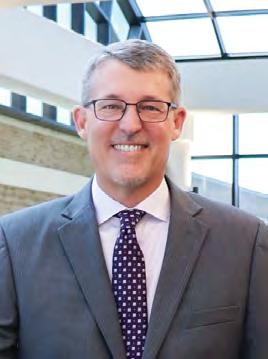
veryone in business knows that as you wrap up one strategic plan it’s time for another. With a successful 2022 Strategic Plan complete, we launched our 2026 Strategic Plan at the start of the 2023-24 school year. Building on our past accomplishments, we are poised to move our college to the next level of accredited schools of business. In this report, please read about our plans to:
• Elevate our residential and online academic programs.
• Accelerate opportunities for our students and alumni through distinctive engagement initiatives.
• Generate societal impact through educational and economic research and service in Abilene and abroad.
• Establish a distinctive position with increased resources and lifetime relationships to deliver experiences and outcomes rarely available at schools of our size.
As we set out to achieve our 2026 goals, we will have to overcome some obstacles in the next few years, as we did for the 2022 plan. The most immediate change comes in the form of the retirement of three long-time, excellent professors: Bill Fowler, Dr. Monty Lynn and Dr. John Neill (’80). As word has spread about their retirements, the accolades from former students and colleagues have provided a wonderful expression of love for what these distinguished faculty members have accomplished. Please take a moment to read about these professors and their legacies.
This is my last Dean’s Report because I, too, am transitioning into a new role in the college. In mid-July, I will begin a yearlong sabbatical that will allow me to recharge, retool for teaching and research, travel with my wife Jennifer, and enjoy the arrival of our second grandchild. I will return to the classroom as a full-time faculty member in Fall 2025.
I will always cherish the opportunity to serve and lead with colleagues, alumni and friends who truly desire to live our vision of connecting, inspiring and equipping the next generation of business and technology professionals. Thank you to all of you who have embraced this vision. As you will see in the following story, we have achieved some great milestones during my time as dean. Your support has been a great encouragement to me personally and professionally.
The future is bright. Stay with us and encourage all in your network to join us as we honor God and bless the world through business and technology education.
With much gratitude,
Dr. C. Brad Crisp (’93) Dean, College of Business Administration
SITC students in the SIGCHI chapter won this year’s Top Scholars STEM award at ACU’s Undergraduate Research, Creativity and Innovation Festival.
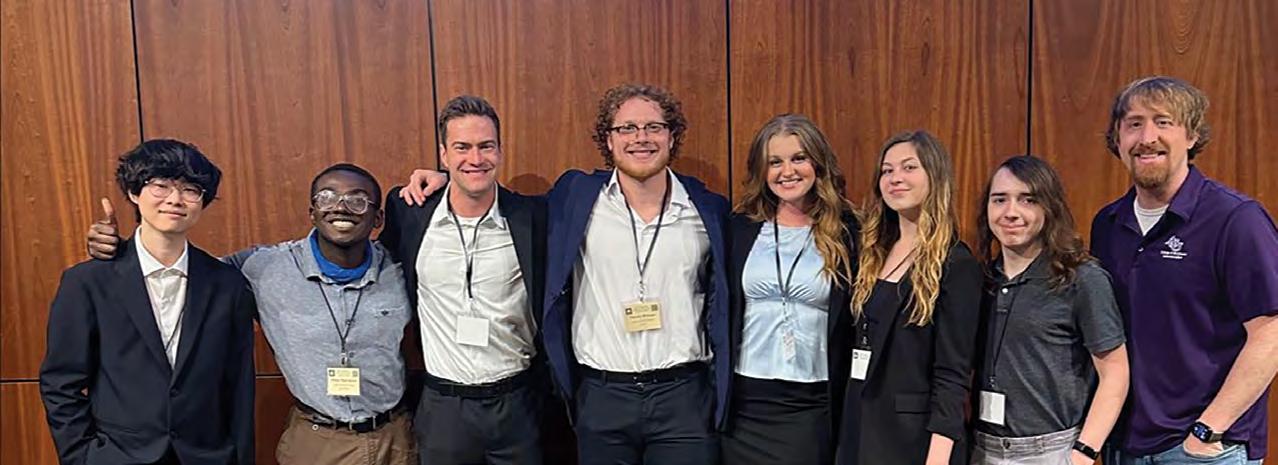
ACU Young
We connect, inspire and equip Christian business and technology professionals who honor God and bless the world.


As of May 31, 2024, STAR (Student Trading and Research) students managed $2.9 million of ACU’s endowment.
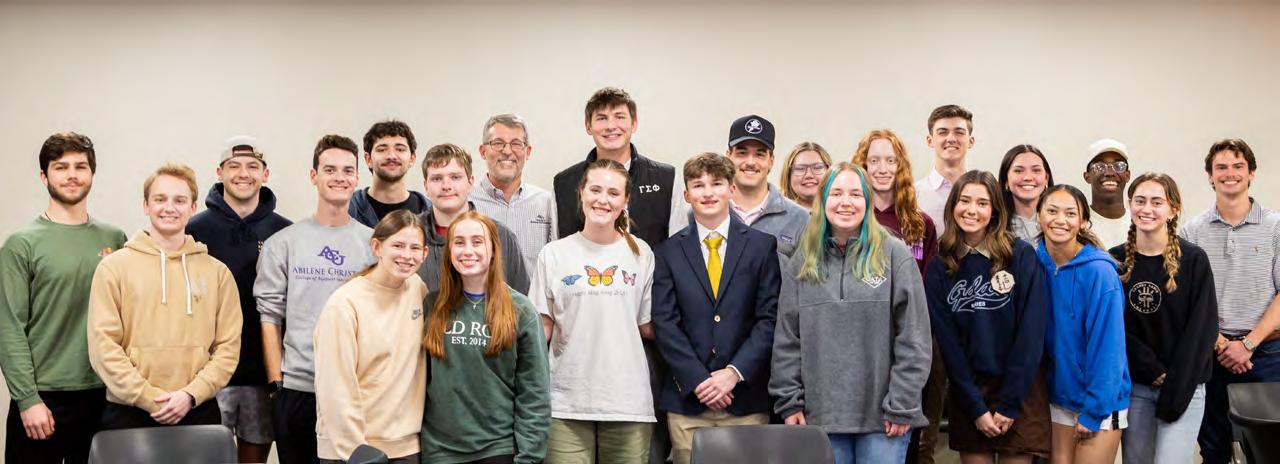



Crisp delivered the blessing over graduating seniors one final time as dean in early May before beginning a yearlong sabbatical. ACU will name a new dean of COBA this summer, and Crisp will return in 2025-26 as a full-time faculty member.
E“May the peace of the Lord Christ go with you, Wherever he may send you. May he guide you through the wilderness, Protect you through the storm.
May he bring you home rejoicing
At the wonders he has shown you.
May he bring you home rejoicing Once again into our doors.”
ach year since becoming dean of the College of Business Administration in May 2016, Dr. Brad Crisp (’93) sent graduating seniors into the world with the words of that favorite Celtic blessing spoken over them.
“The prayer points to the blessings of God’s presence in all circumstances,” Crisp said, “as well as the hope that our students will remain connected with us, telling the stories of what God has done in their lives.”
That excerpt from the prayer also offers peace and a reminder that home – and the relationships that go with being home – are always available to everyone. It’s appropriate that Crisp would choose a lyric about coming home as the blessing he would speak over students. If Crisp’s eight-year tenure as the dean of COBA is marked by one thing, it would be how much he values relationships. A recent visitor to campus commented on COBA’s generational commitment to relationships throughout the history of the college, and that is a legacy that Crisp has embraced.
Relationships with students. Relationships with colleagues. Relationships with graduates, donors and friends of the university. Relationships with family. It’s who he is, and it’s been his lighthouse during his eight-year tenure as dean.
“Brad has kept us focused on relationships,” said Tim Johnston (’80), assistant dean of COBA. “We want to engage our students while they complete their studies, but we need to help each other for a lifetime. I like the blessing he always shared with our graduating students because it demonstrates his kind pursuit of relationships.”
Crisp delivered the blessing over graduating seniors one final time as dean in early May before beginning a yearlong sabbatical. ACU will name a new dean of COBA this summer before Crisp returns in 2025-26 as a full-time faculty member.
The fifth dean of COBA since it became a college in 1981, Crisp leaves the post with a long list of accomplishments, but just as long a list of people influenced and relationships created. Those are part of what has made his tenure as dean a success.
“Brad carries himself with dignity, honor and a spirit of Christ-like humility,” said Andy Little (’97), associate dean of COBA and associate professor of business law. “He constantly reminds me to elevate my perspective, see
the good in others and treat people as worthy of our highest respect. I've been blessed to have a handful of good professional mentors, but none have had Brad's exceedingly rare combination of kindness, wisdom, intellect, patience and faith. We will miss his influence on the college dearly, but he deserves a sabbatical and time to reflect and recharge. I look forward to being his colleague and friend on the faculty for many more years.”
The list of accomplishments during his tenure is long and has COBA positioned to continue its rise when the new dean steps in. During his eight years, Crisp hired more than a dozen new faculty members plus key administrative staff, oversaw a complete renovation of the Mabee Business Building, moved COBA into the world of online education, successfully integrated technology into the core curriculum and led the charge to require internships. He oversaw successful accreditation processes for the Accreditation Board for Engineering and Technology (ABET) and the Association to Advance Collegiate Schools of Business (AACSB).
Many of these accomplishments resulted from the college’s completed 2022 Strategic Plan, which built on the strengths he inherited and positioned COBA to reach new heights through the college’s new 2026 Strategic Plan. The college’s endowments grew by more than $58 million during Crisp’s tenure, advanced significantly by a $29 million estate gift from the Dukes family in 2022. Crisp also directed new scholarship funds to attract and retain residential business students.
teaching and scholarly work. He poured into actively engaging with AACSB, serving on many site-visit reviews. He garnered insights that guided us through successful AACSB re-accreditation processes. He took to heart the desire to advance our college with continuous improvements.
“Brad has navigated the difficulties of attracting talented scholars to ACU and our mission,” Johnston said. “He did that at a time when online education has been a driving force for all business schools across the country. All new hires would have to be capable of teaching our residential and online students. The drive to help all faculty build the skillset to teach with multiple modalities is a critical accomplishment. A snapshot of the faculty in each program – many of whom Brad hired –shows people committed to our mission who have impressive credentials and are moving the vision forward.”
I’ve been blessed to have a handful of good professional mentors, but none have had Brad’s exceedingly rare combination of kindness, wisdom, intellect, patience and faith.
– Andy Little “ ”
He did that without letting go of his belief in the vision set out for COBA: to connect, inspire and equip Christian business and technology professionals who honor God and bless the world.
“Brad is steady, and he quietly makes progress on the plans we have set out,” Johnston said. “He has stayed focused on the goals at hand and helped us take the right next step. That helped us keep moving, and we continuously made progress. Brad is dedicated to
Crisp recognizes that much of his success stemmed from his deep history with ACU, having been immersed in the ACU culture since he was young. His father, Don Crisp (’64) was chair of the Board of Trustees, and his father-in-law is former ACU president and chancellor, Dr. Royce Money (’64).
And he’s following in the footsteps of men like, among others, Dr. Bill Petty (’64), Dr. Jack Griggs (’64) and Dr. Rick Lytle, all COBA deans who taught and mentored thousands of students over the years, including Crisp.
“Being the dean of this college is about legacy and relationships because you’re following in the footsteps of people who’ve done this and shown the way and built a foundation for what you’re doing,” Crisp said. “I’m fortunate to have important, ongoing relationships with those men. I also have relationships with so many peers, donors and other people who love this place and want to figure out how to help the current students in what they want to accomplish.”
Crisp leaves the job having positioned the next dean for success but knowing that a new set of challenges awaits the college.
“Our students are coming from different
perspectives within and outside the Christian world,” Crisp said. “We can't make the same assumptions about who they are and what they know. We must create opportunities for them to engage their faith as they acquire the skills needed to become the professionals we want them to be. And at the end of the day, they're going to be the ones that decide who they want to be and how they live.
“But we've got a tremendous opportunity to put them in connection with other people who are going to give them a vision for what their life could look like as a Christian business or technology professional,” he said. “I don't think we've finished that process at all. We are wrestling with how we do that. I hope the next team will help us push that forward in some important ways, just as we started online conversations before I became dean. And we settled some of those things. So, can we build on that? Can we put new processes and structures in place and maintain that as a primary focus of who we are and what we do?”
Crisp said he plans to use his sabbatical to recharge his batteries, retool for research and teaching, travel with his wife Jennifer (Money ’93), visit family, and enjoy the arrival of a second grandchild. He’ll return to the classroom at ACU in Fall 2025, where he will again engage with students daily, helping lead them in the direction that best fits their skills.
“I’ve always enjoyed the engagement with students,” Crisp said in the spring. “I’ve got 15 students in the one class I’m teaching right now, and the first assignment was a cover letter and resume, so I’m helping them think from Day 1 about who they are and how they want to present themselves professionally.”
The relationships with students and faculty as colleagues excite Crisp about the next season of his life.
“I will miss the opportunity to engage with as broad a group as I have had the last eight years,” Crisp said. “The relationship is different when you manage people instead of working alongside them as colleagues. I have certainly had to have some hard personnel conversations, but these can be holy times, too. I’ve also had the chance to walk with people through hard times, helping them work through issues, and those moments are special. Some of my free time will allow me to create opportunities that keep me engaged with people inside and outside ACU. I don’t know exactly where my focus will be, but I know I’ll want to do more than be in the office 9 to 5 and then be done.”
Undoubtedly, he will focus on doing what he finds most important: building relationships.
$58 million
Increase in COBA endowments from 2016 to 2023.
$29 million
Largest academic gift in ACU history, received in 2022 from the Dukes estate.
$9 million
Price tag of recently completed, four-year Mabee Business Building renovation.
$650,000
Student scholarships awarded in FY23, up from $265,000 in FY18.
2,688
Apple fritters consumed by COBA faculty and staff in Fritter Friday tradition.
1,021
Fall 2023 enrollment in COBA programs (six of the eight highest enrollments since 2007 occurred in the last eight years).
13
Full-time COBA faculty in 2024 hired by Crisp (37% of total), who also hired the majority of staff.
2
Strategic plans formulated, AACSB accreditation reviews completed and online undergraduate programs launched.
1
Unifying mission to educate Christian business and technology professionals.
COBA celebrates three faculty retirees who collectively have more than 100 years of service to ACU
It shouldn’t surprise anyone who knows him that Bill Fowler – who retired in June after 40 years at ACU with 33 of those as a full-time member of the COBA faculty –teed up a golf ball shortly after turning out the lights one last time in his Mabee Business Building office.
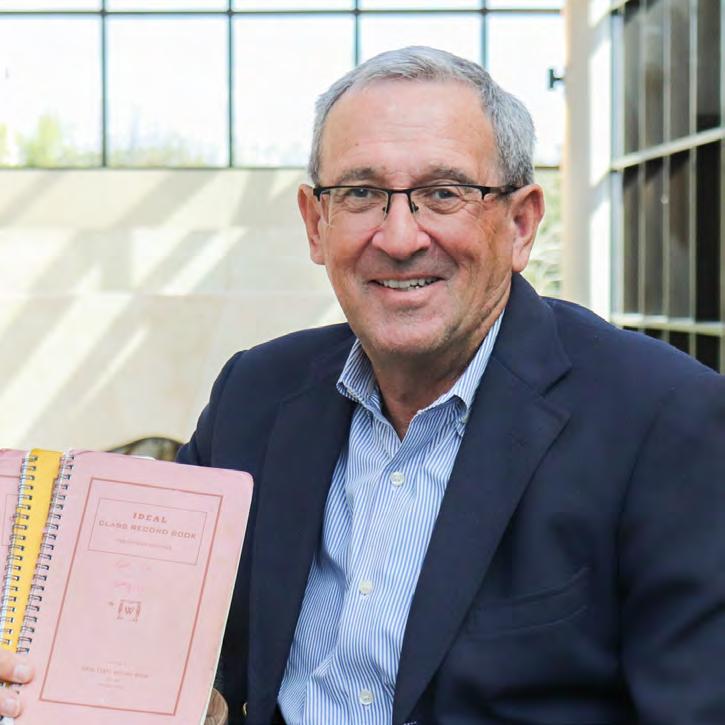
Since he joined the COBA faculty as an associate professor of accounting, Fowler wasn’t hard to find. He was either at work, home, church or on the golf course, and not necessarily in that order.
“I imagine I’ll be out on the golf course pretty quickly,” said Fowler, who admits to a “fourish” handicap he hopes to nudge down a little further in retirement.
“Some people would say I can’t play much more than I already do, but I’ll give it a shot.”
Fowler’s love of golf is one of the first things that comes up among his colleagues when asked about his time at ACU and how difficult it will be to replace a man whose desire for every student he’s taught is to make a lifetime friend. The other is his sense of humor, which keeps his
conversations, classroom and office enveloped in laughter.
“I like to have fun,” Fowler said. “I have enjoyed harassing students and the people up and down the hallways in our building. We have a good time here, which might surprise some people. That’s one of the things I’ll miss. I’ll miss teaching classes because I still love being with the students. But I’ll miss hanging out in the halls and interacting with people.”
That’s because, more than anything, Fowler is a relationship-builder. He has kept handwritten grade books from his first 15 or 20 years on the ACU faculty and will refer to them when he’s thinking of a former student or, more and more lately, the child of a former student. It’s his way of reconnecting to those relationships.
In a recruiting video posted to the COBA Facebook page in 2021, Fowler showed those grade books and said, “What’s important to me about these books is not the grades in them, but my friends from years ago. As you come, we hope you’ll be not just a student but a lifetime friend.”
“That’s the whole deal right there,” Fowler said. “I’m not going to say I know or remember 100% of the names in those books or of the students I’ve taught, but I can see probably 90% of the faces of the students I’ve taught. And I know where most of them are living and working. That’s been the greatest blessing of all – just being a snippet of their walk and maybe a continued part as they go forward. That’s been the greatest part about being here.”
“
Crisp said. “I see him light up when accounting firms return to campus, and he’s talking to each representative. And if they were a student here, he wants to talk to them and find out what’s going on in their lives and about their experience working at the firm they’re representing. He has been the example of investing in lifetime relationships with students.”
His ability to connect with his students was never more evident than during a five-minute period in one of his classes in Fall 2014. Earlier that summer, one of his daughters suffered a condition that required surgery and substantial rest and recovery. One day in class, Fowler broke down as he updated students on his daughter’s condition.
” What’s important to me about these (grade) books is not the grades in them, but my friends from years ago. As you come, we hope you’ll be not just a student but a lifetime friend.
– Bill Fowler
Dr. Brad Crisp (’93), who has served as dean of COBA since 2016, said Fowler’s commitment to relationships is what makes him an excellent instructor. In 2015, then-dean Dr. Rick Lytle announced a professorship established by Mark (’86) and April (Bullock ’89) Anthony honoring Fowler, and in 2020 students named an office in his honor during a renovation campaign.
“When you do something for as many years as Bill has done it, you’ve got a whole host of students out there that are appreciative of him and grateful for him,”
“I was trying to update them on the situation, but I wasn’t doing very well,” said Fowler, who got emotional recounting the story. “I paused because I was breaking up a little bit, and this sweet student with her soft voice asked, ‘Mr. Fowler, can we pray for you?’ I just kind of mumbled that it would be OK, and the students gathered around me, and she led the prayer, which was awesome. If I can point to a five-minute segment out of the 40 years here at ACU, that would be near the top.”
And it’s because it confirmed everything Fowler knew to be special about ACU.
“This place is where I feel comfortable sharing part of my life, and students feel comfortable enough to ask if they can pray for you in that moment, surround you, and pray for you,” he said.
“I’m thankful to have been in this place with students who care for me and vice versa,” Fowler said. “That day there was a sense of sharing something with those kids and receiving the peace of Christ in return. I was grateful for the moment. I don’t remember the exact words, but what she said and prayed for was what we needed, and it felt comfortable, and I was grateful that it provided a sense of peace. I’ll miss those moments because they tell you everything about what ACU is and what it means to me.”
Dr. Monty Lynn has served ACU and the College of Business Administration for 39 years as a professor of management. In all honesty, he’s been much more than that in a career that, in June, officially ended in retirement.
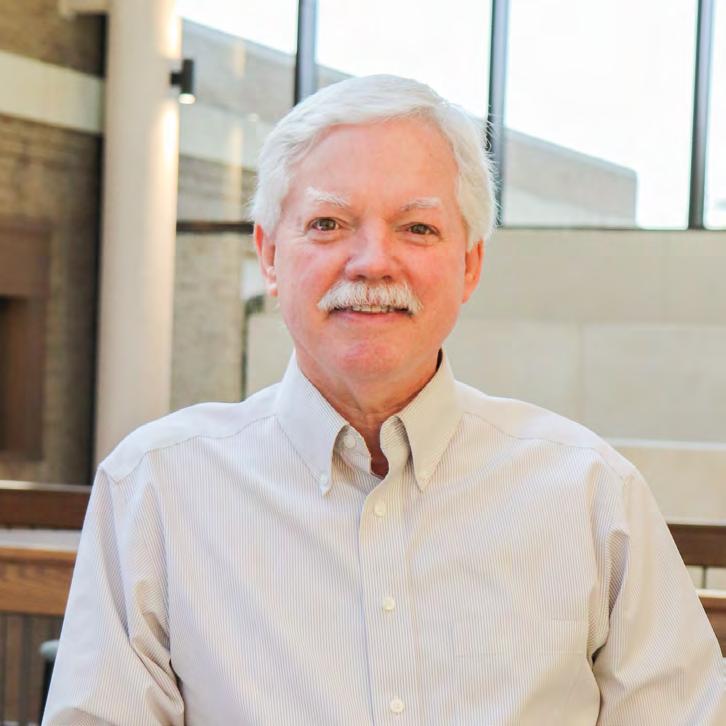
The humble Lynn has held many leadership roles in COBA: chair of the Department of Management Sciences, interim dean, associate dean, director of the MBA program, director of the Center for Business and Economic Research, and the W. W. Caruth Chair for Owner-Managed Business. Even though Lynn has not held the permanent title of dean in his tenure, COBA associate dean Andy Little (’97) said he still draws the kind of respect those men have attracted, and he deserves a great deal of credit for COBA’s continued excellence. He’s been a researcher and a writer, worked on social and emotional issues, dabbled in religious studies and poverty, and is now studying and researching how financial scarcity affects decision-making. He can’t be pigeon-holed into one category, which is just fine for a man who spent his youth in Portland, Oregon, and Memphis, Tennessee, and found his way to Searcy, Arkansas, where he earned two undergraduate degrees at Harding, then went to Cornell for a master’s degree and then Utah for another master’s degree before earning a Ph.D. at Brigham Young. Later, he earned a postgraduate degree at the University of London’s School of Oriental and African Studies.
His varied background allows him to converse or serve as a mediator on any number of subjects, something his co-workers in COBA appreciate.
“More than once, I have walked into Monty's office frustrated about something, and he has helped me talk it through (to a solution),” said Dr. Mark Phillips (’88), professor of management. “I have heard him described as ‘Steady Eddie,’ as in no flash, just consistently there to help.”
Lynn’s varied interests and how he’s gone about his business reflect the leadership he’s served under for 39 years in COBA. The deans he’s worked for – from Dr. Bill Petty (’64) to Crisp and the others in between – have
allowed him to research and teach in a way he might not have been able to teach at other universities.
“I’ve been blessed that COBA has always supported research,” he said. “Education can be territorial, but that’s never been the case in COBA. We work in an open research community that affirms the pursuit of interesting and valuable questions that often have a faith component.”
Lynn taught management, health care administration, international poverty and development, and the Introduction to Business courses, incorporating his natural curiosity into teaching.
“I’ve taught the freshman business course the last couple of decades,” he said. “We sampled several different topics, from accounting to marketing to financial management and law,” Lynn said. “That breadth sparked several ideas to follow up on in research.”
Incoming freshmen now won’t be taking Introduction to Business under the mild-mannered Lynn. They also won’t be experiencing his first test.
“Freshman students often need a great deal of guidance and nurturing, and Monty provided that on top of his excellent teaching,” Phillips said. “I suspect that Monty has taught more of our current grads than any other faculty member in COBA’s history. The funniest student comment I ever heard about Monty was, ‘He is so nice, and he looks so gentle, and his class is so enjoyable, and then – bam! – the first exam is a killer!’ ”
ACU Gives event plus future commitments totaled more than $100,000 toward purchasing necessary classroom furniture to finish the building renovations.
But the accolades that go along with that honor – as well as any praise for Lynn and his career – are quickly deflected by the soft-spoken father of two and grandfather of seven, who credits any of his success back to COBA’s leadership and the college’s continued commitment to ACU’s Christian ideals.
“The mission has stayed consistent,” Lynn said. “There’s been no mission drift. The values that inspired Libby and me when we visited in 1985 are in place today. Those values include a deep commitment to Jesus Christ, a commitment to actively living your faith, to living your faith in the classroom, to valuing students, and to not dying on the vine but staying active professionally and growing. Those are strong and unerring. We’ve had so many great leaders at COBA who’ve continued to help us keep our eyes on those values.
“ ” I can’t imagine a life in consulting or business. My life has been here, and it’s been as a teacher. And I identify with that more than anything else. I’m a teacher.
– Monty Lynn
In the future, COBA students – whether in their first year or last at ACU – will be taking classes on the Monty Lynn Floor, the newly named third floor of the Mabee Business Building. Donations during the recent
“I don’t know what else I would have done,” he said when asked if he had any regrets from the last 39 years. “I can’t imagine a life in consulting or business. My life has been here, and it’s been as a teacher. And I identify with that more than anything else. I’m a teacher.”
“The three things that come to mind for me when I think of Monty are the wisdom of Solomon, the patience of Job, and the impressive white mustache of Mr. Monopoly,” Phillips said, referring to the board game character. “I have said more than once that I would take a bullet for Monty Lynn, and when I consider what I hope to be like when I am a little older, Monty is one of the people I hope to become more like.”
There can be no higher praise for a self-described explorer from Oregon who found a home in Texas.
Dr. John Neill (’80) took a most circuitous route to a 40-year career teaching accounting and finance at three universities, including spending the last 24 years at ACU.
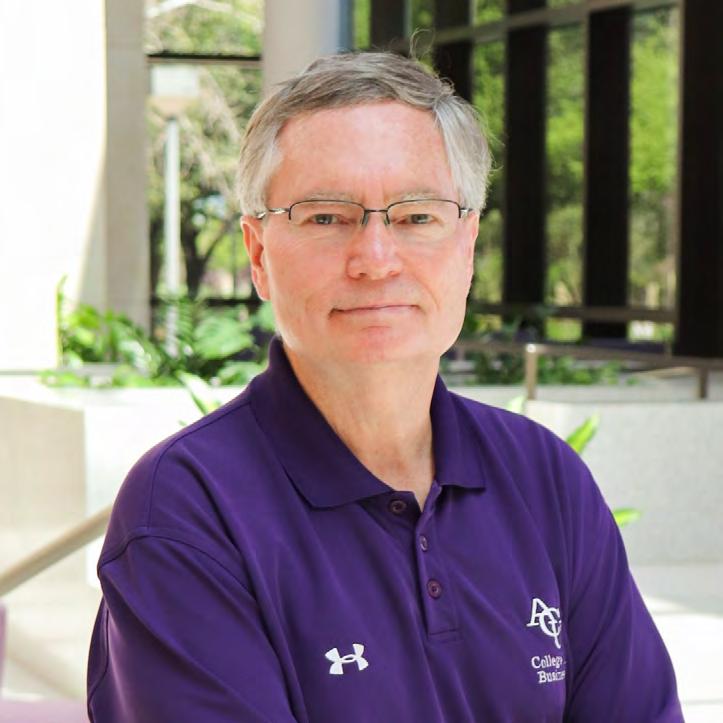
Neill retired at the end of the 2023-24 school year, and he leaves behind a large hole to fill in COBA. Neill’s steady hand, wise words, and unwavering loyalty to the mission of ACU and COBA will be missed.
But had it not been for a simple twist of fate while he was a student at ACU, Neill might never have gotten into teaching, much less accounting and finance.
Neill – who lived in Abilene as a child before moving away and returning – graduated from Cooper High School in 1977. He enrolled at ACU and graduated in 1980, then worked for Pennzoil in Houston before returning to ACU to study for a master’s degree in religious studies.
While at ACU, he was asked to serve as an adjunct professor for an accounting class while working on his graduate degree. Surprising himself, he fell in love with the classroom. So much so that when he finished his master’s degree in 1984, he took off for Gainesville, Florida, where he earned his Ph.D. in accounting from the University of Florida in 1990.
Leaving the corporate world behind and turning his focus to teaching, Neill made stops at Florida State and Chapman (Orange County, California) before returning to ACU in 2000.
“I never really wanted to be a preacher, but I wanted to be a minister of some sort,” Neill recalled. “Maybe it’s sort of the same mentality of teaching and preaching, but I’m not sure about that. I taught some as a doctoral student at the University of Florida, and then my first job was at Florida State University. And as I went along, I realized how much I enjoyed being in the classroom.
“After being at Florida State, I went to Chapman University, a private school without the Christian emphasis,” he said. “I liked the small, private
nature of the school, but I missed the emphasis on a Christian education. When I had the opportunity to come back home and back to ACU, I found some of everything I wanted.”
The relationships with students and colleagues and the opportunity to work in an environment that matched his beliefs kept Neill at ACU when he could have gone to other universities or numerous jobs in the private sector.
“One of the main reasons I stayed at ACU is the mission,” he said. “I believe what we do and how we do it is important. The other reason is the colleagues I’ve worked with over the years. I enjoy the people I work with in our department. When I went to school at ACU and began working here, people always asked why I stayed, and I always said it was because of the people and relationships.”
He was also working for a university that has built one of the top business schools in the country and was the recipient of a gamechanging $29 million gift from the Bill and Janie Dukes estate in late 2022 that will revolutionize COBA in countless ways. Before that gift, though, Neill believed the business students graduating from ACU were as good as those graduating from any other school in the country.
“We have a good reputation of having prepared students who work hard, and we’re proud of that,” he said. “I want our students to realize that they are getting a quality education, but the most important thing is the Christian ideals they’re being taught –along with finance or accounting or whatever it might be – don’t stop when they leave here. We all want them to find a church home wherever they are, be part of the community and have a work-life balance. Work is important, but it can’t be their entire life.”
Neill said he would miss the chance to talk to students and give that kind of advice, along with words of wisdom on what ACU can offer students.
“
” When I had the opportunity to come back home and back to ACU, I found some of everything I wanted.
– John Neill
“I’ve had some partners in some of the top accounting firms in the country come to campus and tell me, ‘The students here are really good, but they don’t think they’re as good as they are,” Neill said. “Sometimes our students might be intimidated because they work with a bunch of people who went to Texas or Texas A&M or SMU or wherever, but they shouldn’t feel that way because they have been well-prepared.
“I've never taught freshmen; the classes I teach are traditionally a second-semester junior and a senior-level class,” Neill said. “But when I was department chair, I met with the first-year students in new-student orientation. One of the main things I always told them was they would get a fresh start here. A person who was the most popular in high school might not be that here. Conversely, someone with a bad reputation could start over here. Or if a student’s grades weren’t good in high school, they could turn them around here. I wanted to ensure they understood they had a fresh start here.”
It was that style that stuck out to Crisp when thinking about Neill and his impact on the students who have gone through the Mabee Business Building.
“John Neill is a genuine, personable guy with a sneaky sense of humor,” Crisp said. “He has done an excellent job for us and his students. I remember his authentic presence, and I think the students really appreciated him. He’s someone who exemplifies the commitment we have for our students.”
hen Dr. Brad Crisp (’93) was appointed to serve as dean of ACU’s College of Business Administration in May 2016, he inherited both a college on the rise and one that had grown more complex from the days when it comprised just two business departments.

COBA had been on the cutting edge of several innovative initiatives, including launch of a School of Information Technology and Computing (SITC) in 2007, establishment of the Griggs Center for Entrepreneurship and Philanthropy in 2011, formation of the online MBA partnership with ACU Dallas in 2015 and creation of the Lytle Center for Faith and Leadership in 2016.

During Crisp’s tenure as dean, he led the college to pursue strategic plans as well as adjustments to its operations and culture that allowed each of these initiatives to flourish, both individually and in partnership. For example, as part of a substantial update to the B.B.A. degree in 2023, all business majors now take an introductory business course supported by the Lytle Center, an introductory entrepreneurship course delivered by the Griggs Center and an introductory analytics course taught by SITC faculty.
In addition, Crisp helped the college implement new initiatives, including creation of the Heacock Scholars program in 2019, launch of online undergraduate business majors in partnership with ACU Dallas in 2020, awarding four-year scholarships to most entering freshmen beginning in 2022, and the 2023 launch of the Dukes School of Finance, including the Dukes Scholars program.
Perhaps the most enduring accomplishments of his deanship involve resources that will benefit the college for years to come. COBA’s endowments grew by more than $58 million, led by the $29 million Dukes estate gift in 2022. Crisp oversaw a four-year Mabee Business Building renovation project and hired 13 of the 35 current full-time faculty in the college.
Crisp – who will step down as dean this summer and then take a one-year sabbatical before returning to COBA in 2025-26 as a professor – recently sat down for a Q&A as he looks back on COBA’s accomplishments during his tenure as dean and ahead at what the future holds for one of ACU’s signature programs.
COBA has enjoyed some exceptional accomplishments over the last eight years. What initiatives must continue to progress to elevate COBA’s already excellent academic programs by 2026?
Crisp: We’ve been a strong business school for a long time, but how do we grow in reputation and impact? The most substantial change to our core educational model came with the launch of online business programs. Any good business school is engaged in the online space right now. That’s what students expect, so that’s a pivotal move for us, and I believe we’re executing it at a high level.
Perhaps our biggest shift in identity is that we are now a college of business and technology. We must continue to integrate the School of IT and Computing into the culture and mission of the college, building on our strengths in computer science and digital entertainment technology while advancing areas such as analytics that combine business and technology.
And, at the end of the day, we must be able to attract and graduate academically prepared students in high-caliber residential programs. We have added the Dukes Scholars and Heacock Scholars, tools that attract bright, talented students and engage them while they’re here. We’ve always had strong experiential programs for students, and we’re starting to turn those into even more ways to have a lifetime positive impact though the Griggs Center, Lytle Center and our professional development programs.
Building on that answer, what qualities are needed in those areas to continue moving in the right direction?
Crisp: The forward-looking ideas we have implemented must be grounded in our mission and vision. The students and alumni we’re engaging in this process are thinking about how we go forward. They want to see us at our best. Figuring out what those markers of quality in scholarship and student experiences look like is critical to our success.
Quality inside and outside the classroom sends a different signal of what you can be if you come to ACU and are part of COBA. And that has to be accompanied by fantastic outcomes. We’ve had a long history of doing well in accounting, but that world has shifted. We’re re-making ourselves to address that change. We talk a lot about finance and what expansion in that area can mean for COBA, and that’s something we’re digging into. It’s at the intersection of accounting, finance and technology where everything connects with our faith and how we’re developing leaders. What we’ve done with the next strategic plan is create a framework for vetting those ideas, leading us to make choices about what we build on.
The Dukes gift has given COBA and the finance department so much freedom to dream big about how the entire operation can be re-made. How much time have you had to give to thinking about the difference the gift will make in the life of COBA?
Crisp: We just named our first cohort of Dukes Scholars this year, and people are starting to see the fruits of the labor it took for that gift to come together. For years, our faculty have done a terrific job of teaching their students and doing the work of being a professor. But in some cases, they didn’t have the resources they needed, and if you don’t have the resources, it’s hard to imagine having a vision of doing much different from what you were doing at the moment. But now, they have a chance to dream.
We’ve got a lot of people thinking about what this can look like. Not only people in COBA, but across campus as well as alumni and friends who are very invested and interested in what this will become, and how it will shape the future of COBA. We’ve had many conversations about the best way to steward the gift. Of course, anything we do will be centered on our Christian mission and relationships. Those are non-negotiables. But we’re also asking how we can differentiate the program, such as a unique area of finance that we want to specialize in to set us apart. Those are the kind of questions we need to answer, but it will be a combination of the best ideas and the most accessible ways to execute those plans that will dictate how we move forward.
With the momentum the college has right now, COBA is well-positioned for what’s next. What do you see in the future for COBA?
Crisp: We’ve set the table for what’s about to come. We won’t have to have significant conversations, for example, about our physical facility or the online space. We’ll need to continue to manage our portfolio of academic programs, while staying focused on the holistic development of our students.
I can’t say exactly what the new directions in each department will be, but I know they’ll be built on top of our Christian mission. I know what kind of faculty we’ve already assembled, and I expect the people we will add next will be consistent with our culture and mission and bring skills and abilities that will make us better. Our strategic plan calls for a potential college naming gift, so we anticipate the additional resources and opportunities that kind of gift provides. The foundation is built, and I’m confident we’re ready for whatever is next. COBA’s brightest days are ahead of us.
In 2023, COBA faculty, staff, students, alumni and friends engaged in a process to formulate strategic initiatives to guide the college through 2026. The following summarizes key elements of the plan along with progress updates from the first year under the plan.
Deliver distinctive residential and online programs for business and technology students that excel among our competitors in Texas and nationally in Christian higher education.
• Name the college: Rebrand and promote a named college of business and technology.
• Establish brand-leader programs: Promote selected programs with potential to gain a top 50 national ranking, such as the new Dukes School of Finance.
• Increase student profile and enrollment: Attract high-performing students with scholarships and scholars programs, growing to 1,120 students by Fall 2026.
• Target key metrics: Achieve reputation and outcomes for programs among top 10 in Texas and top 5 in Protestant Christian universities.


The launch of the Dukes School of Finance, provided by the $29 million estate gift, offers the first step for our branded finance program. Highlights for the inaugural year include:
• Establishment of the Dukes Scholars, attracting and elevating the student profile with provided scholarships.
• Creation of the Swinney Finance Lab, complete with the atrium stock ticker, upgraded facilities and technology, and Bloomberg Certifications with 12 terminals coming in Year 2.
• Experiential learning opportunities in Chicago, New York and Dallas.
• Increased networking with finance alumni and friends.

Most trips to New York City involve plenty of sightseeing, tours, shows and musicals, and expensive trips to some of the world’s best restaurants. They don’t usually involve sit-down meetings with some of the top financial minds in the country. But that was the design of a trip last fall for eight students in ACU’s Dukes School of Finance.
Those students – seven of whom are in the first cohort of the Dukes Scholars – were led on the trip by Dr. Jonathan Stewart, professor in the Dukes School of Finance. Stewart has been taking students to New York for several years, allowing them to visit some of the top financial institutions in the world and ask questions of the leaders of those companies to find out what it takes to make it in New York.
Stewart and his students visited with leaders from Bank of America, Evercore, Court Square Capital Partners, Tiger Global Management, RBC Capital Markets and Goldman Sachs. They toured Nasdaq and met with some of the leadership of the second-largest stock exchange in the world. They also met with a panel of young professionals in the finance industry who are members of the Manhattan Church of Christ.
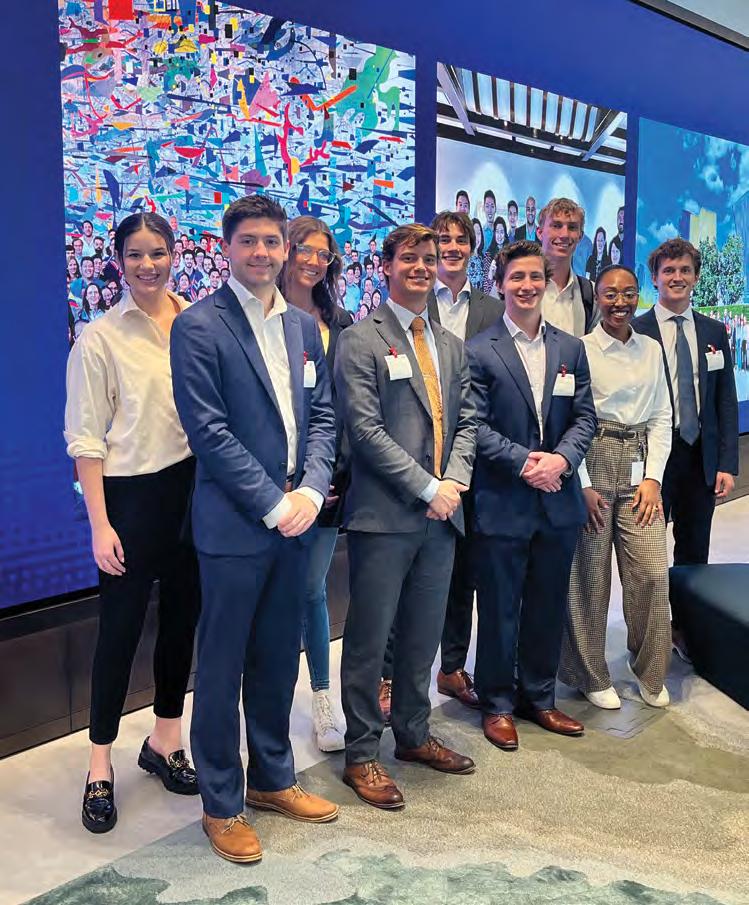
Stewart said he always gets help from ACU alums in the financial industry, using their connections and contacts with industry leaders in New York to set up the trip. One of those ACU graduates who helped this year was Steve Swinney (’94), based in Colorado and CEO of Kodiak Building Partners, who tapped his contacts in New York to meet with students from his alma mater. Swinney said he hoped his contacts showed the students all that is possible for them in finance.
“The Dukes School of Finance at ACU is a tremendous opportunity for finance students to have so many career doors opened to them that maybe they haven’t had in the past,” he said.
“I wanted them exposed to all that is possible for them. They must know their ACU education is preparing them for great things. We need excellent Christian finance leaders in the business world.”
A crucial part of the trip was discussing how faith and business mix. Stewart said that while making connections was paramount for the students, allowing those students to see that faith and high finance can mix was just as important. That’s why the panel with professed Christians who are also leaders in the financial industry was part of the tour. The time shared at Manhattan Church of Christ was to ensure the ACU students left New York knowing their faith wouldn’t be trampled in the City That Never Sleeps.
Offer a holistic experience that larger schools cannot match because of their size, smaller schools lack the resources to deliver, and that embodies our commitments to Christian faith and lifelong relationships.
BUSINESS UNDERGRADUATE
Outcomes percentage at six months 93%
Average salary $54,563
• Craft branded experience for developing professionals: Guide students through growth milestones by facilitating alumni, faculty and peer mentoring alongside formative experiences such as internships, semester-length projects and study abroad.
• Cultivate lifelong alumni engagement: Pilot mentoring program for early career professionals, while fostering networking and service opportunities for all alumni.
• Target key metrics: Support and challenge graduates to be relationally connected, spiritually formed, academically prepared and professionally developed.
TECHNOLOGY UNDERGRADUATE
Outcomes percentage at six months 93% Average salary $53,920
ore than 50 companies from Texas and Oklahoma were represented last October for the first joint career fair, sponsored by COBA and the Department of Engineering and Physics at ACU’s Hunter Welcome Center.
Jasmine McCabe-Gossett (’10), professional development and internship director, wanted to give COBA students a chance to sit across from potential employers with their resumes and talk about themselves and what skills they would bring to an organization.
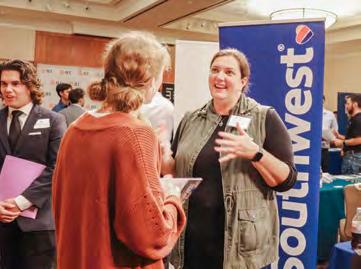
Various companies with local and international presences participated in the fair, providing our students with options that appealed to all. Business and technology students were able to engage with companies within
MASTER OF ACCOUNTANCY
Outcomes percentage at three months 100% Average salary $66,667
the following industries: real estate, hospitality, IT services, consulting, distribution, financial services, sales, health care and more.
“We want to connect students with employers, especially students looking for full-time employment,” McCabe-Gossett said. “But a considerable focus is to connect employers to potential interns. In the lead-up to the event, we hosted several different workshops to help students feel comfortable and confident, starting with a workshop focused on identifying personal values and what it looks like to live out your faith in the workplace authentically.”
The career fair’s success has McCabe-Gossett already planning the 2024 event, which is set for Oct. 3. Would your company like to be represented? Scan the QR code for more information.

Almost 80 students earned 3 credit hours in the mountains of Colorado while growing personally, spiritually and professionally at Leadership
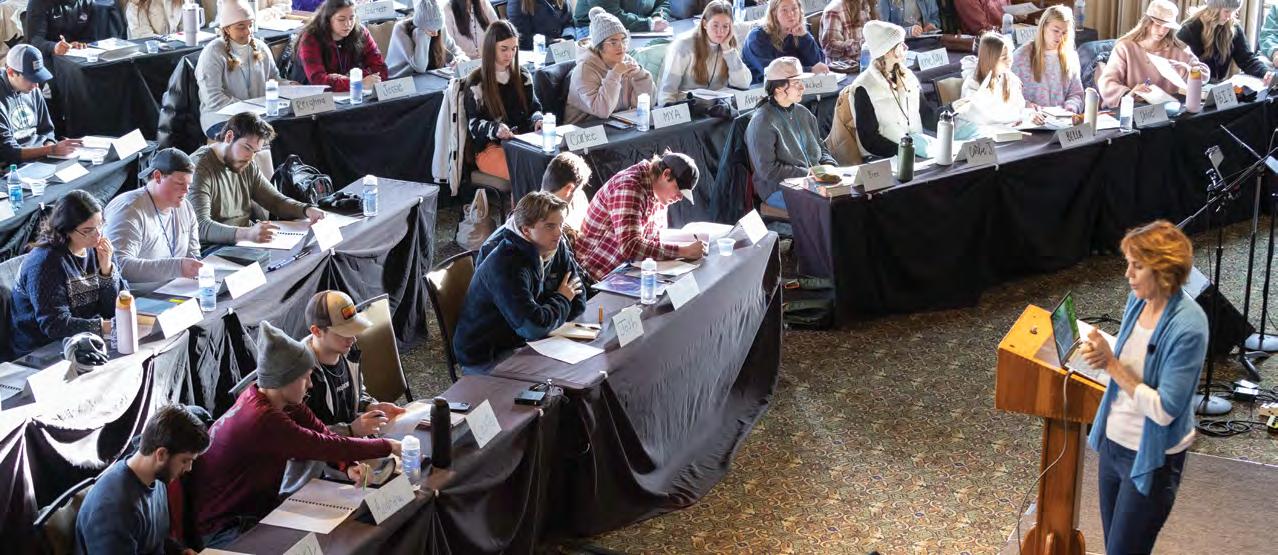


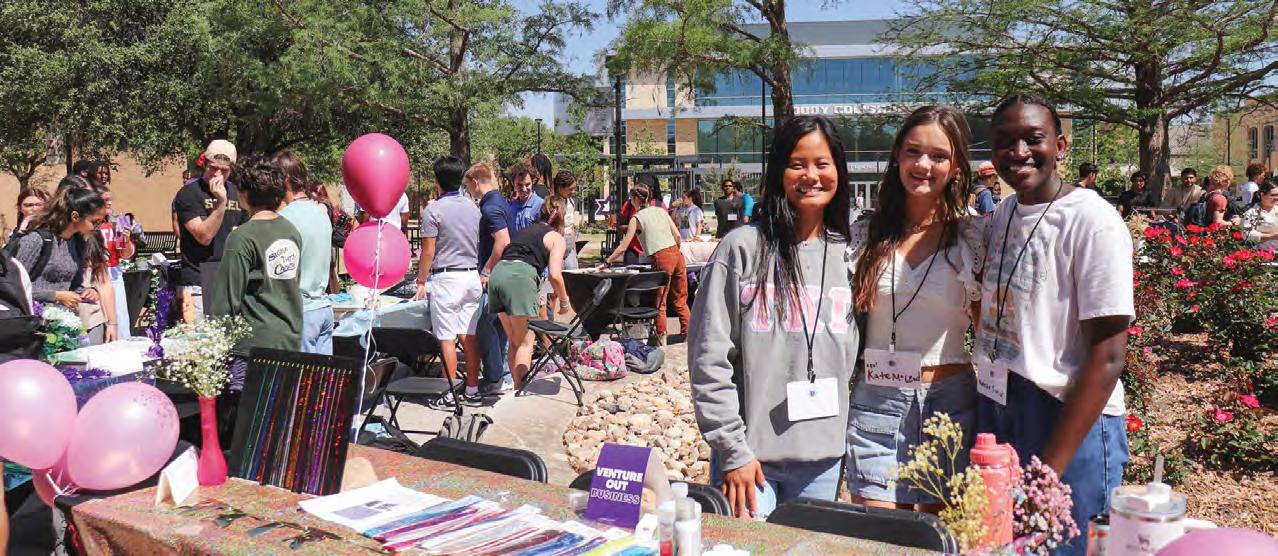
Honor God and bless the world by enabling our students, faculty, staff and alumni to make a meaningful difference through research and service.
$100K
awarded this year to Abilene nonprofits by students in the philanthropy class, in collaboration with the Community Foundation of Abilene and the Philanthropy Lab
Dr. Brent Reeves (’80) and Dr. James Prather (’14 M.Div.) (left to right in the image) were recently featured in the most widely read publication in computer science, Communications of the ACM. Their article discusses opportunities and challenges of AI for professors and students. They additionally have proposed a pioneering new programming problem type, aptly named Prompt Problem, for teaching computer science in this era of ChatGPT. Prompt Problems are currently being studied in computer science classrooms in Portugal, Finland and Saudi Arabia. Recently funded by a grant from Google, Prather and Reeves continue to study how novice programmers use AI. Their published research will be presented at conferences in Honolulu, Hawaii; Milan, Italy; and Melbourne, Australia, this year.
• Increase economic and educational access: Expand class projects with partner organizations, research student consulting project approaches and outcomes, and add scholarships to promote experiential learning among lower-income students.
• Extend research and service: Foster interdisciplinary research collaborations with potential impact and visibility. Partner to address a tangible problem in Abilene.
• Target key metrics: Advance ACU’s growth in research as a national university while also having a direct impact on people in Abilene, Texas and the world.
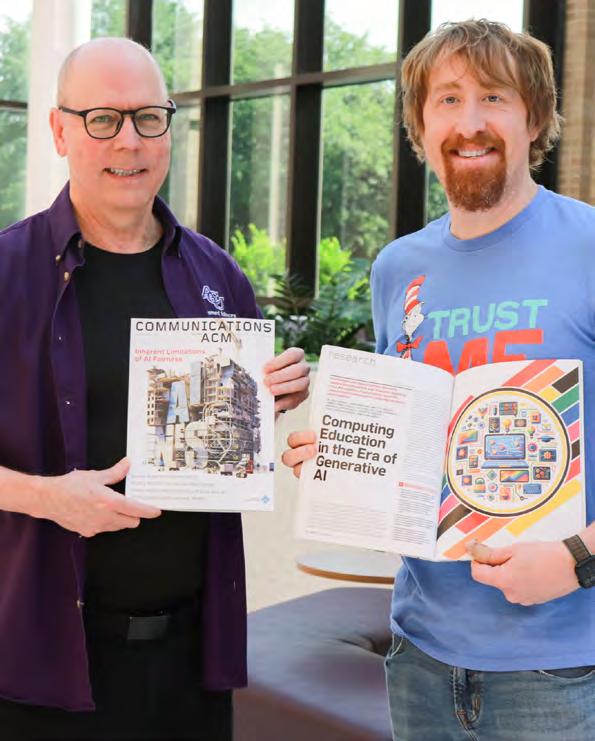

COBA students, faculty and staff traveled to Costa Rica during Spring Break to meet with CATIE and entrepreneurs in the area, including Wearsos—a joint venture with Southwest Airlines’ “Repurpose with a Purpose.”
As part of its Societal Impact Plan, COBA has partnered with CATIE (Tropical Agronomic Research and Teaching Center) in Costa Rica for the last several years taking students during Spring Break and the summer for the Costa Rica Consulting Class. During Spring Break, students participated in projects in Costa Rica that helped them hone their business skills, regardless of major. Part of the trip was spent meeting with rural entrepreneurs, each of whom is the recipient of a Southwest Airlines sponsorship. Students listened to the entrepreneurs
pitch their ideas and will provide each micro-enterprise with feedback to help them further their business. Another group of students is pouring into the financials of Wearsos to help them be more financially viable, as they try to improve the lives of women artisans while upcycling Southwest Airlines leather.
These partnerships not only help better the businesses and lives of those entrepreneurs in Costa Rica, but they also provide students with experiences that grow their knowledge and compassion to help others create a better future for themselves and their communities.
Four conference proceedings earned exemplary citations in 2023:
• Brent Reeves, James Prather, et al., March 2023: Using Large Language Models to Enhance Programming Error Messages. Technical Symposium of Computer Sciences Education, 2023.
• James Prather, Brent Reeves, Arisoa Randrianasolo, et al., March 2023: First Steps Towards Predicting the Readability of Programming Error Messages. Technical Symposium of Computer Sciences Education, 2023.
• James Prather, et al., March 2023: Programming is Hard – Or At Least It Used to Be Educational Opportunities and Challenges of AI Code Generation. Technical Symposium of Computer Sciences Education, 2023.
• Matt Deeg, Jennifer Golden and Sarah Easter, August 2023: Managing Meaning with Recruitment Efforts: Meaningfulness Portrayals by Companies in Sin Industries. Academy of Management Proceedings, 2023.
Strengthen financial, human and physical resources to support the college’s strategic and operational objectives.
• Develop a $125 million endowment: Secure a college naming gift plus matching gifts to collectively add 20 operational endowments and increase scholarships by 150%.
• Invest in personnel: Hire four to six accomplished scholarly and practitioner faculty and two to four professional staff. Supplement compensation beyond university benchmarks.
• Target key metrics: Achieve top five endowment per student among business schools in Texas and in Christian higher education.
$7,605,000
$84,458,000
University support (75%) Endowment and gift support (22%) Direct revenue (3%)
$7,605,000
Faculty teaching and research (80%)
Outreach, infrastructure and administrative support (13%)
Student programs and services (7%)
COBA Endowment (AS OF MAY 31, 2023)
Dukes School of Finance (34%) Griggs Center (7%)
Student scholarships (28%) Lytle Center (5%)
Faculty development (12%)
Student programs (4%) Operations (10%)
COBA awarded over $650,000 in endowed scholarships to business and technology students in FY23

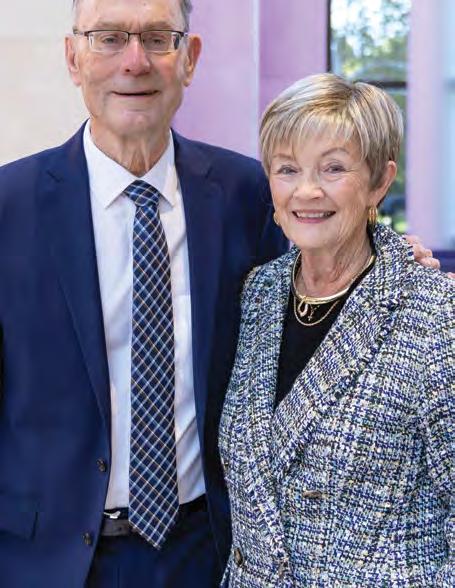

If – as ACU president Dr. Phil Schubert (’91) said on Friday, Oct. 13 – the College of Business Administration has been an engine that has driven ACU’s extraordinary growth over the last 35-plus years, then the man who put the key in the ignition was Dr. Bill Petty (’64).
So, it was only natural that when the Mabee Business Building – which Petty and others planned, fundraised for and saw through to its opening in 1986 – needed a facelift, Petty’s name would adorn one of the newly remodeled areas of the facility.
And that’s why Schubert; Petty and his wife, Donna (Guinn ’64); COBA dean Dr. Brad Crisp (’93); and numerous family and friends were on
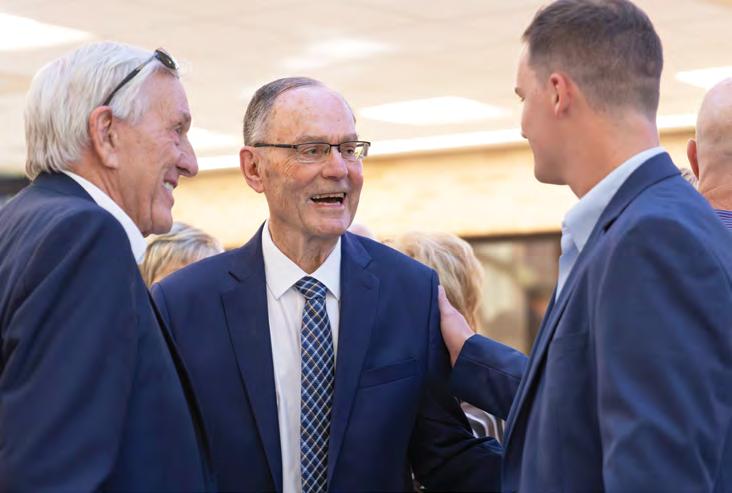
hand during Homecoming 2023 in the Mabee Business Building to celebrate the grand reopening of the Bill and Donna Petty Atrium.
The atrium renovation is part of a multimillion-dollar upgrade of the building that opened in 1986, allowing business classes to move out of the Hardin Administration Building and into a modern facility. The renovation project began out of the need to replace the heating, ventilation, and air conditioning system in 2020. Still, it grew to involve all major spaces inside the building – including classrooms, labs, offices and the atrium – after four summers of construction.
The Bill and Donna Petty Atrium features upgraded technology and appearance to better welcome students, faculty, staff, alumni and business and technology leaders into the building and facilitate networking between these groups.
The atrium project was made possible thanks to a generous lead gift from an anonymous donor and substantial commitments from family and friends. It also received significant support during the ACU Gives event in April 2023, when dozens of donors – many of whom the Pettys mentored –contributed an additional $100,000 toward the $1.4 million renovation.



